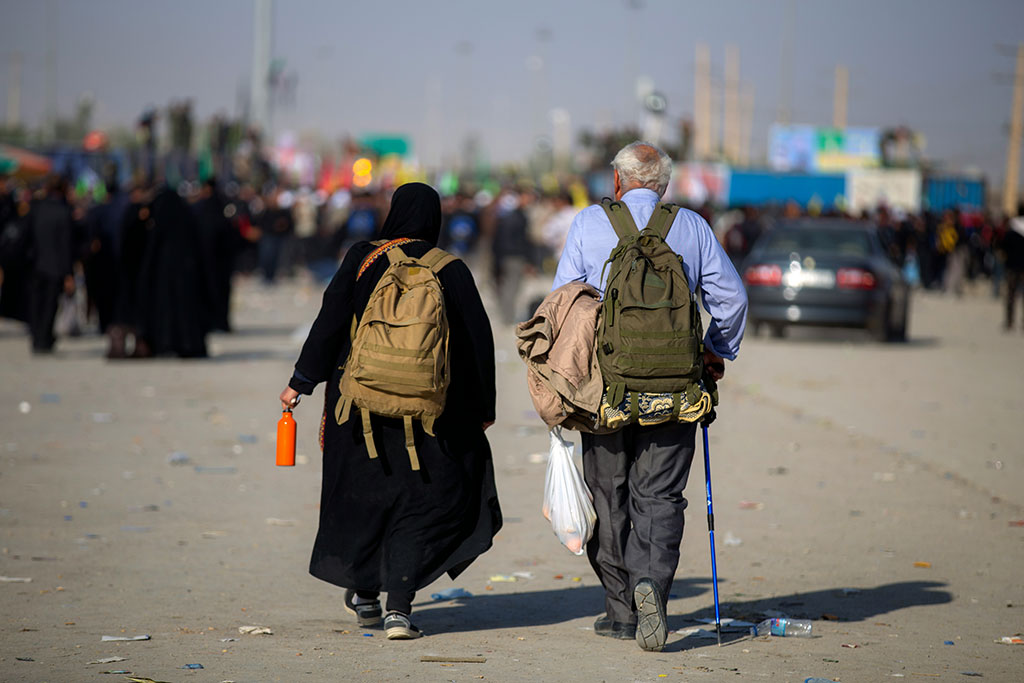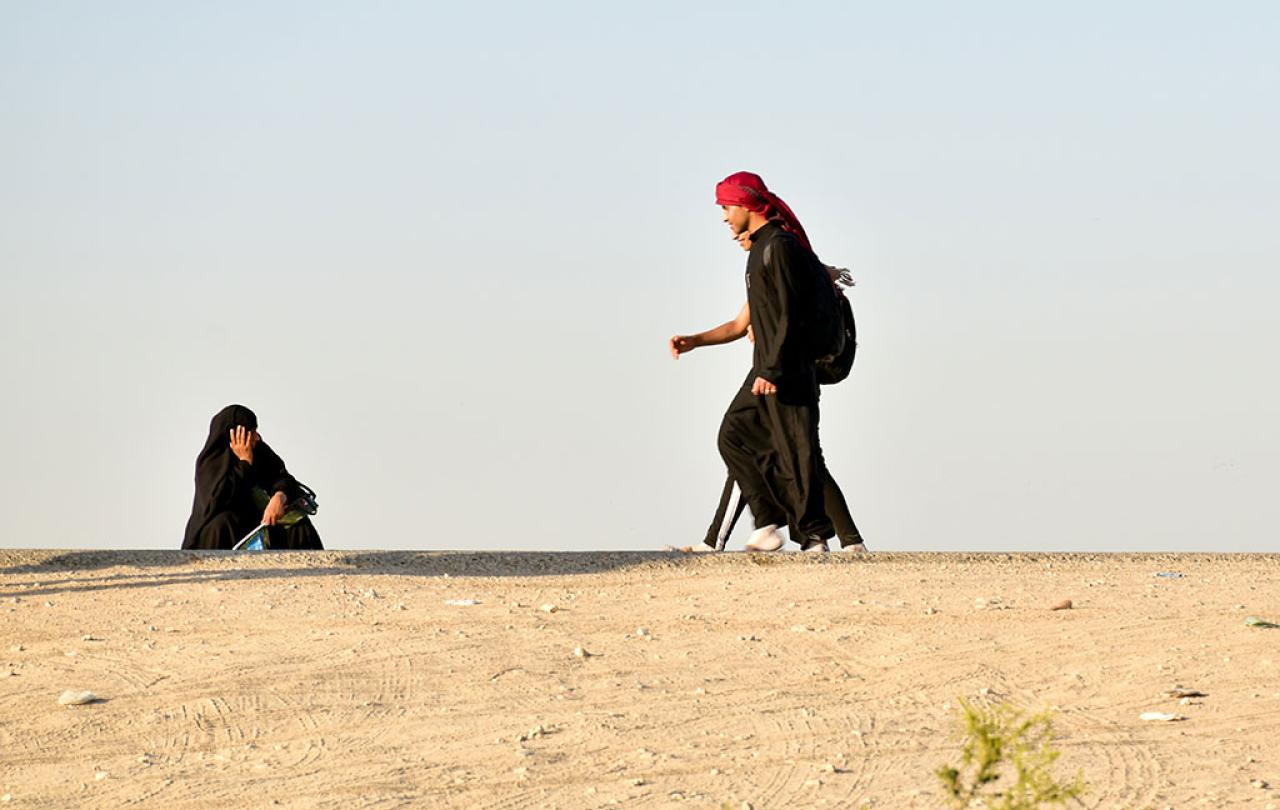
A few months ago, an estimated 20 million pilgrims travelled to the city of Karbala in Iraq. Many were on foot, walking days from cities like Najaf, Basra, Baghdad and even from neighbouring countries. Imagine the population of London and Birmingham deciding to walk from their city to Leicester cathedral to pray. I am not talking thousands here; I am talking millions. Picture being a member of the cathedral staff as they manage the flow of several million people turning up at the entrance to pray, to push them in and to push them out as a never-ending stream of people continues to pour in. This was my experience of the Arbaeen – part of a great Shi’a pilgrimage.
The Al Khoei Foundation, an Iraqi religious charity based in London, had invited me to travel to Iraq. There I joined the pilgrims for a brief part of the Arbaeen (an Arabic word meaning fortieth) and to participate in a conference looking at the impact of Imam Hussein’s life in today’s world. I flew into Baghdad knowing very little about the Shi’a and their beliefs.
In Iraq I saw pilgrims of all ages, genders, able and disabled all walking the same roads, at all hours of the day. I witnessed thousands of volunteers, lining the route offering free food, drinks, and a place to sleep ranging from open tents to their own homes. Hospitality is rendered as a sacred duty to complete strangers.
I spent a couple of nights walking from midnight to 4am on the road from Najaf to Karbala. During countless encounters with pilgrims from all over the world, one question was continually asked of me. “Why does the media in the west not report on this event?” After all it is one of, if not the biggest, annual pilgrimages in the world. There is one bigger event, a Hindu festival in India, but that only takes place every three years. When I asked my fellow sojourner what they would like me to take back from the Arbaeen, the answer was invariably the same. “Tell them what you have seen and experienced here”.
In a sea of black clad Muslims who were displaying zeal and fervour in intense displays of physically punitive rituals, I felt safe, welcomed, and even honoured wherever I went. I was wearing my white robes as a priest which made me stand out from the crowd and often as people passed me by, they would stroke or touch my shoulder as a way of receiving baraka or a blessing from the priest. For, as I learned later, the Christians have a role in the story of Karbala, which for the Shi’a made the story complete when they see a Christian priest among them on this sacred occasion.
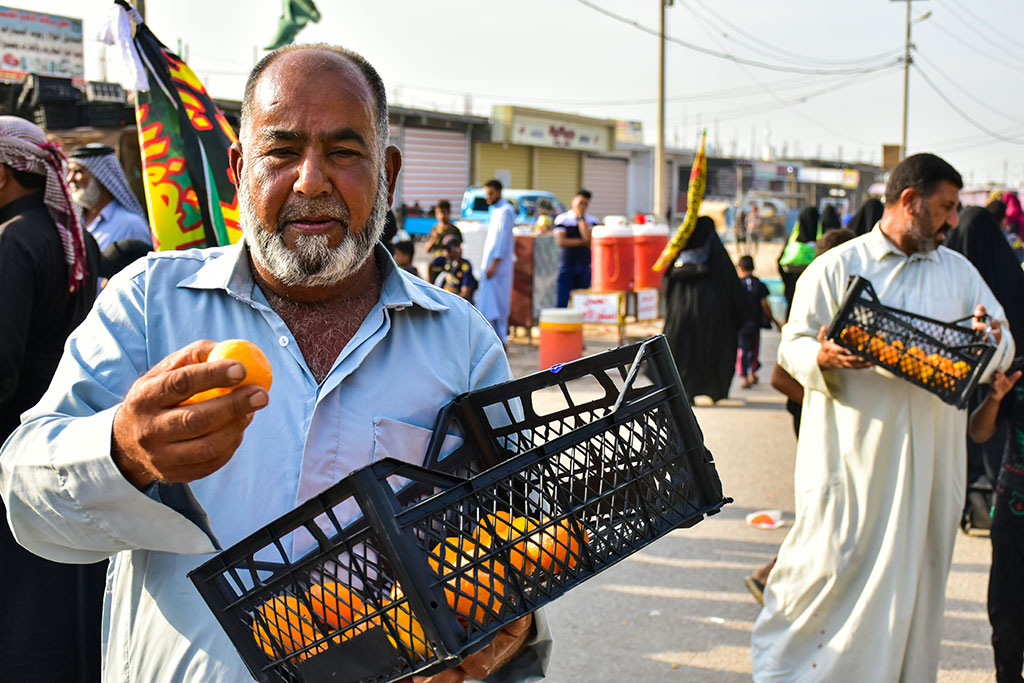
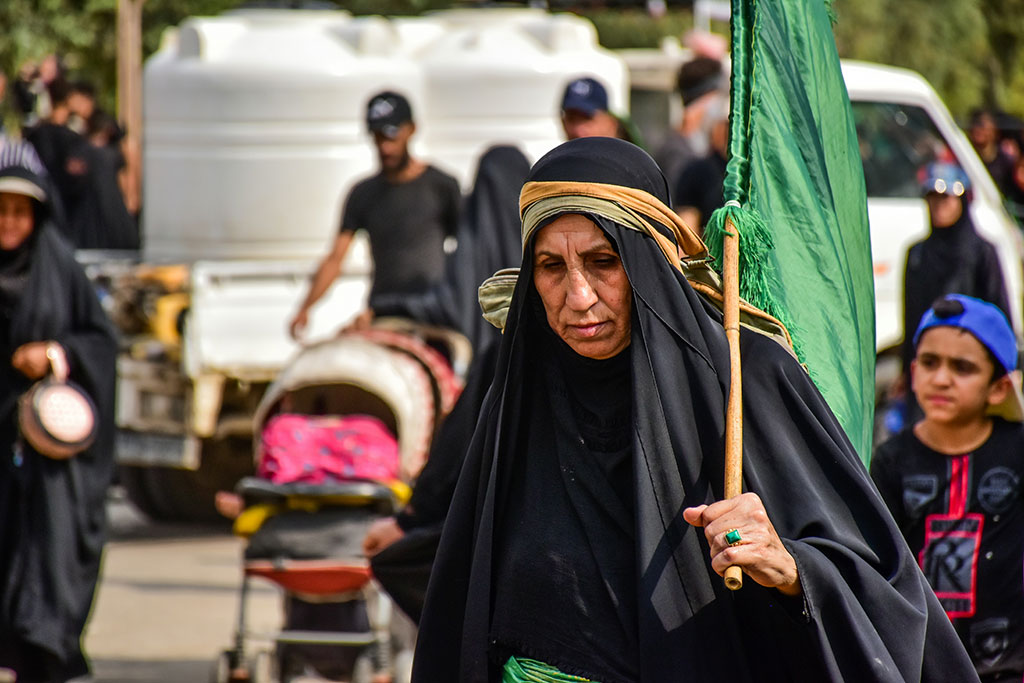
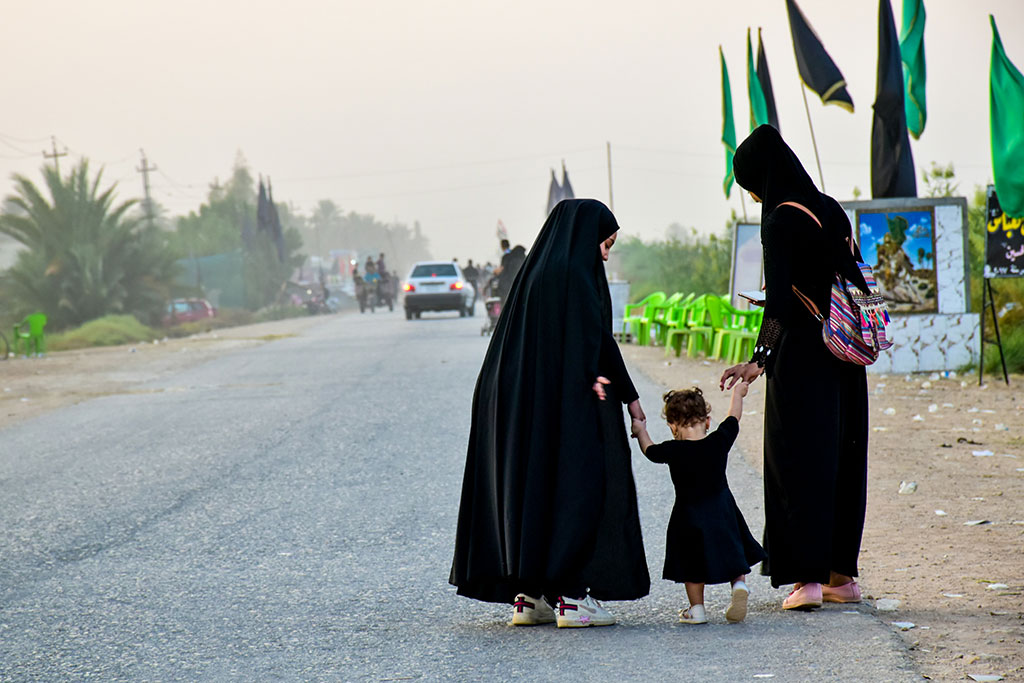
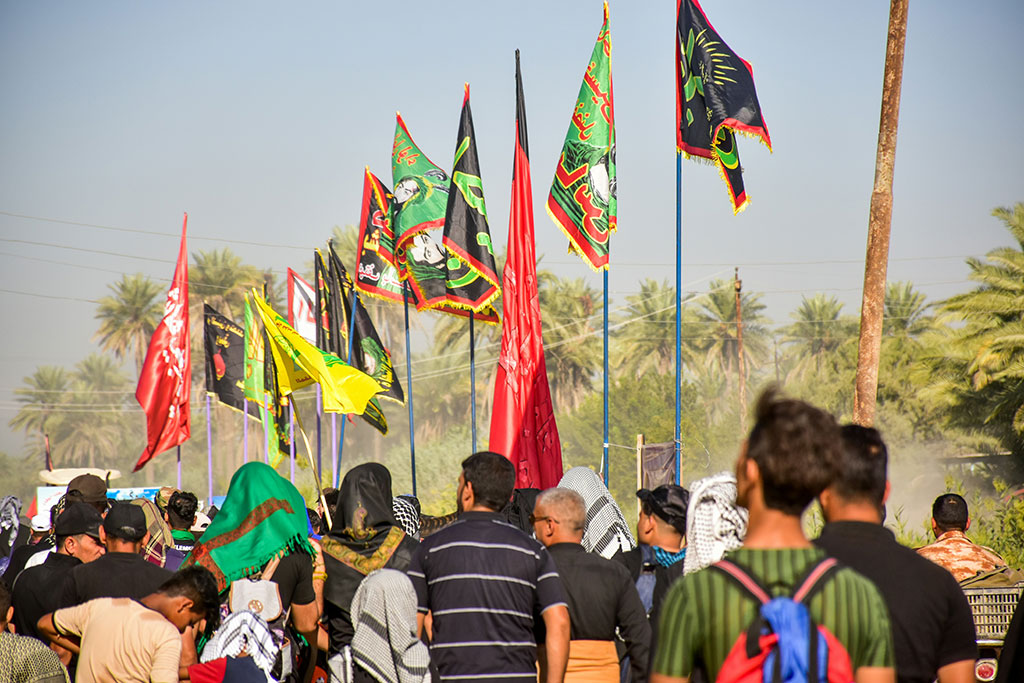
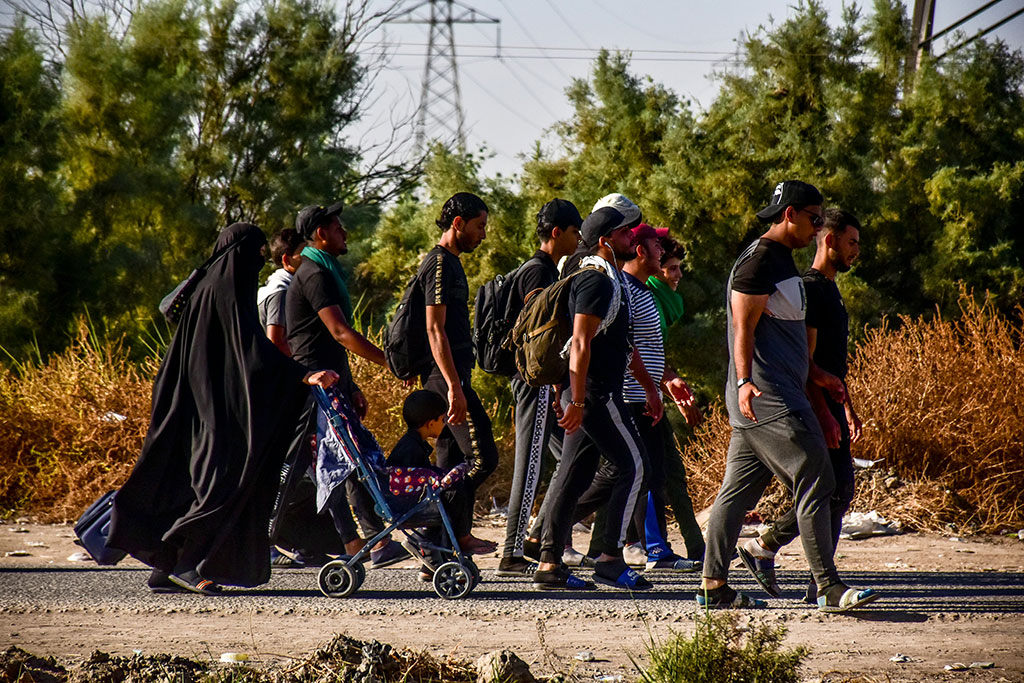
The Arbaeen is an event in which millions of Shi’as relive and remember the martyrdom of Imam Hussein who was killed in a battle at Karbala. This takes place on the fortieth day after the battle was fought following the example of the women of Hussein’s family who returned after captivity in Damascus to lament the loss of their loved ones.
This event is vital in comprehending the split between the two biggest schools of Islam, the Sunni, and the Shi’a. The conflict was triggered by the death of Prophet Muhammad and the question of who would succeed in leading the Islamic empire next. There were those who saw the vacancy needing to be filled by an elected leader who met the criteria of capability and spirituality. Others saw the vacancy as belonging to the prophet’s kin. This would start with Ali, the Prophet’s cousin who was married to Fatima, the daughter of the Prophet Muhammad.
Among those killed, were two Christians who chose to take their stand with Imam Hussein in recognition of his evident spirituality.
After Ali was assassinated as the fourth Caliph (the Caliphs were seen as the undisputed leaders of the Muslim world), Hasan his eldest son became the perceived spiritual leader of the Islamic faithful. Unfortunately, the third Caliph Uthman, had already appointed his successor Mu’awiya who established headquarters in Damascus. This became a time of empire building and Mu’awiya was quickly seduced and corrupted by the trappings of power. The stage for conflict between the Uthmanic regime and the family of the Prophet was set. Assassinations and scandalous behaviour by imperial successors led to the faithful looking to Imam Hussein to take a stand.
Hussein responded. Against all advice, he set off to recruit an army who would take on the Uthmanic empire now led by Yazid. It did not end well. After a series of betrayals, Hussein was reduced to a band of 72 men facing an army of 30,000 troops sent by Yazid. The massacre took place in Karbala, a dusty desert outpost south of Baghdad. The only survivors were the women, including Zaynab, the sister of Hussein and granddaughter of the Prophet. Hussein was beheaded and his body was desecrated by horses trampling his body front and back. While his head was carried off to Damascus in triumph, the rest of Hussein’s body was buried where he was slain.
Among those killed, were two Christians who chose to take their stand with Imam Hussein in recognition of his evident spirituality. A Christian priest demanded the honour of guarding the decapitated head of Hussein overnight in which he reports a divine light emanating through the bandages which wrapped Hussein’s head.
In many ways I felt the Shi’a faith resembled a perpetual Good Friday lament with no resurrection waiting around the corner.
This is the story that the Shi’a recalls during the Arbaeen pilgrimage. It is a massive outpouring of grief for the martyrdom of Hussein who is seen as sacrificing his life for the sake of preserving the message of Islam. It was a way of remembering the betrayals, the injustice, the impossible odds at which Hussein refused to be intimidated. The story of Hussein provokes a blend of guilt, sorrow, admiration, and a determination of his followers to not betray him or his ideals. This is expressed in ritual lament. The self-flagellation, the head and chest beating which so often alarms and disturbs a western audience is the Shi’a way of processing these intense emotions. The closest thing I have experienced to anything like this in my own Christian tradition is the Good Friday ritual. In many ways I felt the Shi’a faith resembled a perpetual Good Friday lament with no resurrection waiting around the corner. With no such reassuring good news in their religious narrative, I found myself admiring their resilience and faith, that there is meaning in their suffering.
When was the last time my personal faith mobilized me to go on an arduous journey?
Indeed, they have suffered. There was the brutal persecution under Saddam Hussein, the tragic and senseless Gulf war between Iran and Iraq, massacres by ISIS and Al Qaida. Thousands died. Posters of the young men who were martyred line the highway from Baghdad to Basra.
I was taken to visit the Ayatollahs in their meeting rooms; I came face to face with the intimidating, black-turbaned men who I had seen on media, who never seemed to smile. I came to understand this when I saw the nonstop stream of broken and hurt people who visited them, seeking their wisdom during pain and suffering. I saw a weeping mother who had lost her child to illness find comfort in the ministry of the Ayatollahs who offered her scripture and prayers. Their serious demeanors gave weight to a theology of suffering which was lived and experienced daily.
Our dialogue with one another varied from the cut and thrust of competing understandings on the role and identity of Jesus, through to agreeing on the importance of interfaith dialogue.
I was taken to visit the shrines of the Imams in Karbala, Najaf and Baghdad and on each occasion, I was blown away by the scale and the beauty of them. One shrine could hold 200,000 worshippers at any one time. It was a glittering palace of polished mirror and marble. In this place, thousands of people were fed and watered, and had a place to sleep if they needed to. In terms of capacity and practical hospitality, these shrines made St Paul’s Cathedral in London look small and sterile.
I returned to London deeply challenged by the spirituality and faith of the Shi’a. When was the last time my personal faith mobilized me to go on an arduous journey? To walk miles in punishing heat and be utterly dependent on the kindness of strangers? Somehow, I cannot imagine it.
Learn the story of Imam Hussein, and celebrate that in this epoch-making battle, Christians were there, taking a stand in the face of tyranny and corrupt empire.
I was introduced to Imam Hussein, a figure who had always been on the periphery of my knowledge, but who came into sharp focus on this trip. The language used by the Shi’a to refer to Hussein evoked comparisons with the language used by Christians of Jesus. For example, Hussein was often referred to as the ‘light of the world’, a ‘gateway to heaven’ and even ‘saviour’. I recognized the faith and hope in them, mirrored in my own beliefs in Jesus Christ.
One thing is for certain, I will always have something to talk about with the Shi’a whenever I meet them. When I tell Shi’a in London, I have been on the Arbaeen, they light up, and very quickly we connect deeply through our spiritual experiences.
For Christians in the West, I would encourage them to talk to the Shi’a about pilgrimage, sacrifice, and faith. Learn the story of Imam Hussein, and celebrate that in this epoch-making battle, Christians were there, taking a stand in the face of tyranny and corrupt empire.
After decades of war, terrorism and persecution, the Shi’a are finally emerging into a world of increasing stability. There was evidence of a renewed confidence in their future, as witnessed in the building of new hotels, homes and hospital renovations. They are proactively reaching out to other religious communities and exploring new alliances for a future in which they can feel safe and prosper.
Will the current conflict in the Levant derail these ambitions?
One abiding memory is of a young child, standing with her family in the streets of Karbala at 4am. She was handing out bottles of water to the swarming pilgrims and crying out the blessings of God as they passed by. Indelibly imprinted in my mind was her expression of joy in serving her people. I pray that her future will be marked by peace and freedom from fear.
The Arabeen.
